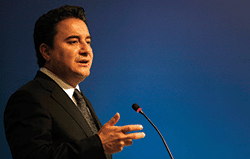 |
| Ali Babacan, Turkey’s deputy prime minister in charge of economic and financial affairs |
Ali Babacan has an affable manner and a courteous approach to visitors. His English is almost perfect; he speaks of financial matters with ease. It is an agreeable welcome from a man at the core of Turkey’s moderately Islamist ruling AK Party, the country’s deputy prime minister in charge of economic and financial affairs. But Babacan and his party’s decade-long honeymoon in government might be nearing an end, despite their still enjoying overwhelming electoral support. The looming withdrawal of US quantitative easing has coincided, this year, with nationwide demonstrations against the political status quo, on a scale that shocked Turks inside and outside government.
Moreover, the perception among independent economists in Turkey is that the AKP’s success in the economy has gone to its head. Another worry is that victories over a secularist military since 2007 have tipped the balance of power, making the AKP less accepting of criticism – to the point of even becoming authoritarian – and less receptive to market forces, ahead of the first mass presidential election in 2014.
